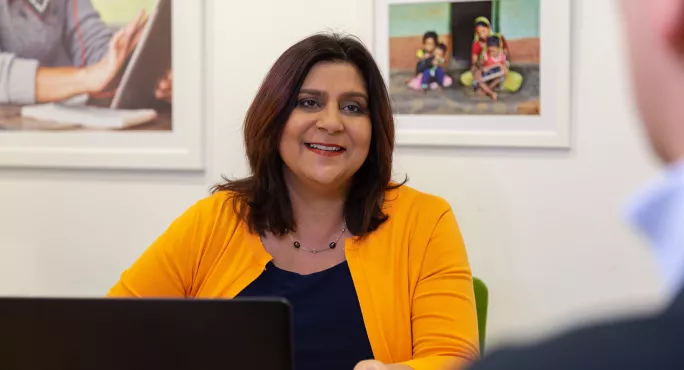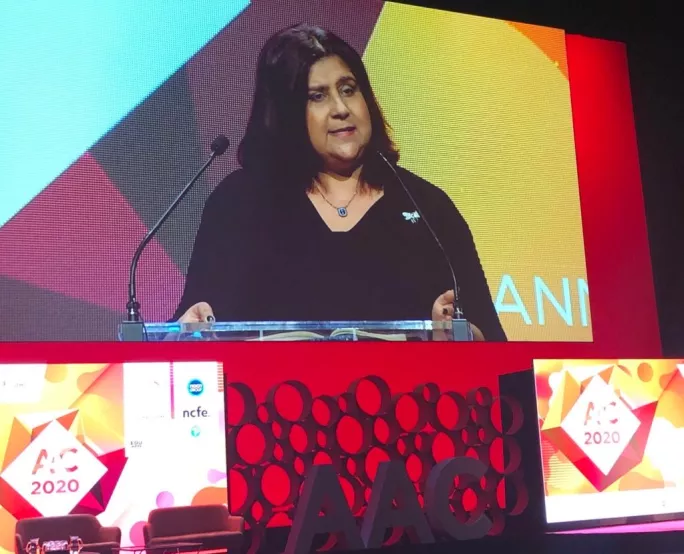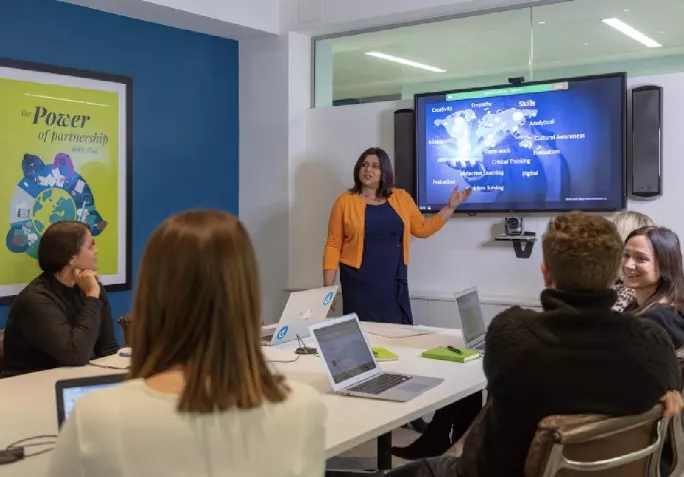
- Home
- Meet Cindy Rampersaud: Pearson’s BTEC champion
Meet Cindy Rampersaud: Pearson’s BTEC champion

When she was 14, Cindy Rampersaud moved back to London after living in Guyana for nine years with her family. Her North London school placed her in remedial reading, without first testing her ability. When she told her aunt, who was the head of English at a large secondary school, her aunt immediately gave her some tests to take, and then sent the results to the school.
Rampersaud was quickly placed in normal English lessons, and at the end of that year she came top of her class. It’s this experience that Rampersaud says instilled a passion for education: the fairness of the system and the importance of access for all.
“What the experience taught me was that if you have people looking out for you, you’re OK. There are so many kids who are talented, who are bright, but don’t have the intervention. They can go through the whole system, not realise their potential and not do their very best,” she says.
“One of the reasons I’m so passionate about BTEC, about access, about fairness is that I think kids can really fall through the system. I think sometimes it’s that bias that seeps in without people realising, but the impact it can have can be quite profound on the life of a young person.”
Equality in education
Without her aunt’s intervention, that bias could have had a lasting impact on Rampersaud. Now, she is the senior vice-president for BTECs and apprenticeships at Pearson. In this role, she shapes the qualifications many take at further education colleges around the country and is responsible for Pearson’s portfolio of technical, vocational and apprenticeship qualifications.
News: New esports BTEC to be taught from September
Opinion: Why I’m done with the phrase ‘the BTEC version’
Background: Scrapping BTECs ‘rash and reckless’, warn principals
Born in Parsons Green, south-west London, Rampersaud was five years old when the family moved to Ghana. Coming back to London and living in Enfield aged 14 was tough, she says, explaining that she was desperate to fit in culturally, and, despite being born in London, the city didn’t feel like home. But she went on to Southgate College to complete her A levels before going to Kingston University to study economics.
Her family had always owned businesses and were “really traditional” - she says she was either going to be a lawyer, a doctor or an accountant. She admits she is “not great with blood”, and that the reading that comes with being a lawyer would have “finished her off”, and so she went for accountancy.
She did her training and exams at BDO Stoy Hayward, in Baker Street, London, and loved it there. At the interview, she says, she immediately felt she belonged. However, quite quickly she realised she didn’t want to be an audit partner, and left to work at Ladbrokes, and later at Virgin, where she says she learned the most in her business career, before working for both Warner Brothers and EMI.
Her early CV isn’t typical of what you’d expect from someone in her role in further education - but when Rampersaud became a member of Richmond Adult Community Board’s board while working for EMI, she felt inspired.
“EMI got sold in different bits and I felt like it was time to take a chance and do something different. I was really drawn to the social, education side of accountancy. I took a year and half out and did some consultancy work, including a project actually at Sony Music. I remember being there just thinking, ‘I don’t want to do this any more.’ It was kind of a light-bulb moment,” she says.

From Brits to BTECs
Rampersaud then applied for two jobs: the CFO role at music board ABRSM and the deputy principal role at City and Islington College. At the time, she says she thought she really wanted the ABRSM role, but now, she says she is grateful she was not offered it.
“I walked into City and Islington and I felt a sense of belonging. The leadership team were amazing. They really cared about their learners. It was a big inner-city college, with diverse learners, from young people through to adults doing A levels and vocational BTECs,” she says.
“They were so committed to their learners. They were really about aspiration. Their passion and commitment to their learners just made me want to want to work there.”
Rampersaud says that she used to joke with her children about going to the Brit Awards - and suddenly it was all about the BTEC Awards. It was while she was at City and Islington that the sector was experiencing deep financial difficulty - a lot of adult education funding, in particular, was cut - but the energy of the students and the drive in them to learn gave her a real appreciation about the power of FE.
“Having to influence and think about how we repositioned ourselves strategically - it was a really, really crucial time. I learned a great deal but it also gave me a real appreciation for what the sector does, and the difference it makes and, and the care for learners,” she says.
“I love the energy of students. I love their hope, I love the fact that you see them progress and hear the stories of people who haven’t attained at school being given an opportunity to shine and actually being put on the right pathway that’s relevant to them and their learning. I always think one of the things about education, as somebody who’s not from education, is that we assume that excellence is the same for everybody, but it’s not because we are all different, and I think the sector really celebrates that difference in its students.”
After four and a half years, the college merged with Westminster Kingsway, and Rampersaud began applying for principal roles. Having been unsuccessful, she set up on her own for a while and began to do some consultancy in the sector, before being asked to apply for one of the new deputy FE commissioner roles.
Rampersaud says she loved that role - and gained a real insight into colleges throughout England.
“I know there have been reports of college structures and failures, but among all of that there is also an awful lot of fantastic practice up and down the country,” she says.
Since Rampersaud left the team, the financial pressure on many colleges has increased, with Hadlow College and West Kent and Ashford going into administration.
She says that, looking back, she isn’t surprised, citing cuts in funding, the diverse cohort of students and changes from apprenticeships frameworks to standards as some of the challenges facing colleges.
“Some of it is about financing, and some is it about talent. I’ve seen some amazing talent in this sector, but as a sector changes or as an industry changes, what you need to do is also support the talent through that,” she says.
“I think it’s a really complex sector actually, but a really important sector that plays such an integral, important role in communities. And it’s going to need to play an even bigger role as we kind of get in the whole economic recovery.”
Being a BTEC champion
Rampersaud left the FE commissioner’s team to join awarding organisation Pearson, something that wasn’t planned. “I don’t do planning, I’ve realised,” she says. When she was first approached by a headhunter for it, she was confused by the role itself. But once she’d been through the interview process, she realised what a good fit it was for her.
“It was an opportunity to stay connected with FE and training providers and stay connected with the cohort of learners that I’m really passionate about. The skills, the employability, the progression” she says.
“I think now if you cut me through the middle, it probably would say ‘BTEC and skills’ because I just absolutely believe in the power of it. There’s almost a million learners a year on these programmes in the UK and internationally and they’ve been on them for years and years and years and years and it does make a difference in their lives.”
She highlights education secretary Gavin Williamson’s speech on FE reform, and stresses the sector has to challenge the idea that the 50 per cent of students who don’t go to university are failures.
“One of the things I think a lot about is that if I look back at my career at EMI or Warner Brothers or Virgin, loads of the people working there probably didn’t go to university, but they were doing an amazing job for the business, for their families, for themselves and actually we need to value everybody in society, irrespective of their pathway,” she says.
“Although when I saw [the job spec for my current role], I didn’t know what it was. Three and a half years later, I’m so glad that I took a chance, because I feel completely committed to it and actually, in my career, it has probably been the role that’s been the most rewarding. We get to shape the curriculum and we see the impact it has. What I love about BTEC is that it really is about access, it really is about inclusion, it really is about progress. It is about ambition, and I just think it’s brilliant.”

Access to education will only grow in the post-Covid era, says Rampersaud - but infrastructure is a challenge we need to tackle first.
“We’ve got this challenge around infrastructure. If there’s anything that we should be doing, it is thinking about the investment in the infrastructure so that kids have access, because actually, if you’ve got access to a tablet or phone or a PC, it helps you access education more readily and have a wide range of education. I think technology is a real enabler and blended learning, in particular, can really increase access for all,” she says.
At Pearson, the focus is not only on ensuring everyone can access education - but also that everyone can access the knowledge and training for in-demand jobs of the future.
“We’ve been doing quite a lot of work looking at our product strategy as a team, and one of the things that we’re looking at is, where is the demand now? And what will be those emerging industries, especially post-Covid and with our increasing reliance on technology?,” Rampersaud says.
“If you think about things like the environment, we’ve been talking about loads and loads, but it’s going to happen, as there’s lots around agri-tech as well as what’s happening around digital, the care and the automotive and automation industries. So for us, it is also about understanding where it’s going to change, and looking how we kind of invest in developing content and curriculum and learning for those sectors, as well as the transferable skills that are relevant to many different sectors - an example of this is the launch of our new esports BTEC qualifications”.
And Rampersuad plans on being at Pearson, shaping that content and curriculum, for a very long time.
“I love BTEC, I love what I do, I love the power of skills and seeing people achieve. We watch the BTEC awards and it’s just incredible to see that. We sponsor the BAME apprenticeship awards and it’s amazing to see that.
“I’ve got a fantastic team, we’ve been together for three and a half years. It sounds corny, but I do just really love what I do.”
Register with Tes and you can read five free articles every month, plus you'll have access to our range of award-winning newsletters.
Keep reading for just £4.90 per month
You've reached your limit of free articles this month. Subscribe for £4.90 per month for three months and get:
- Unlimited access to all Tes magazine content
- Exclusive subscriber-only stories
- Award-winning email newsletters
You've reached your limit of free articles this month. Subscribe for £4.90 per month for three months and get:
- Unlimited access to all Tes magazine content
- Exclusive subscriber-only stories
- Award-winning email newsletters



